class
all objects of a class have the same methods and variables
but different objects can hold different values in the same variable
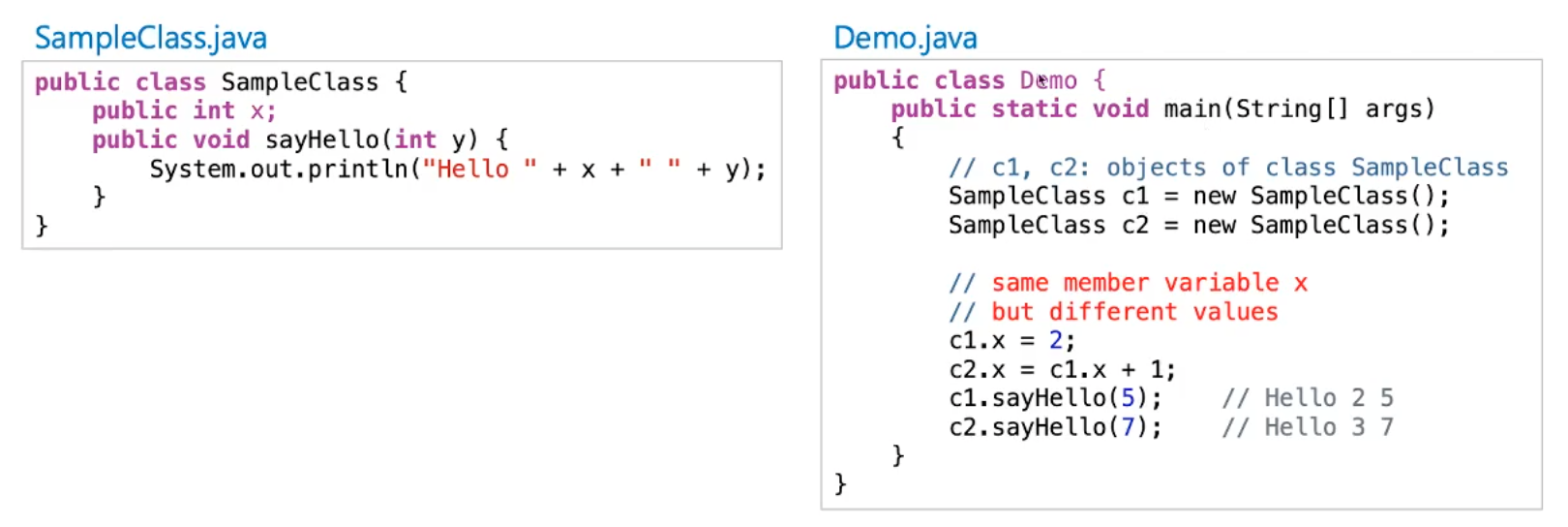
more about methods
2 types of methods
return type (int, string, etc...)
void type
public class SampleClass{
public int x;
public void sayHello(int y) {
System.out.println("Hello" + x + " " + y);
}
public int sqareX() {
return x*x ;
}
}SampleClass c1 = new SampleClass();
c1.x = 6 ;
c1.sayHello(8); // print Hello 6 8
int z = c1.squareX(); // z=36
multiple classes in multiple java files
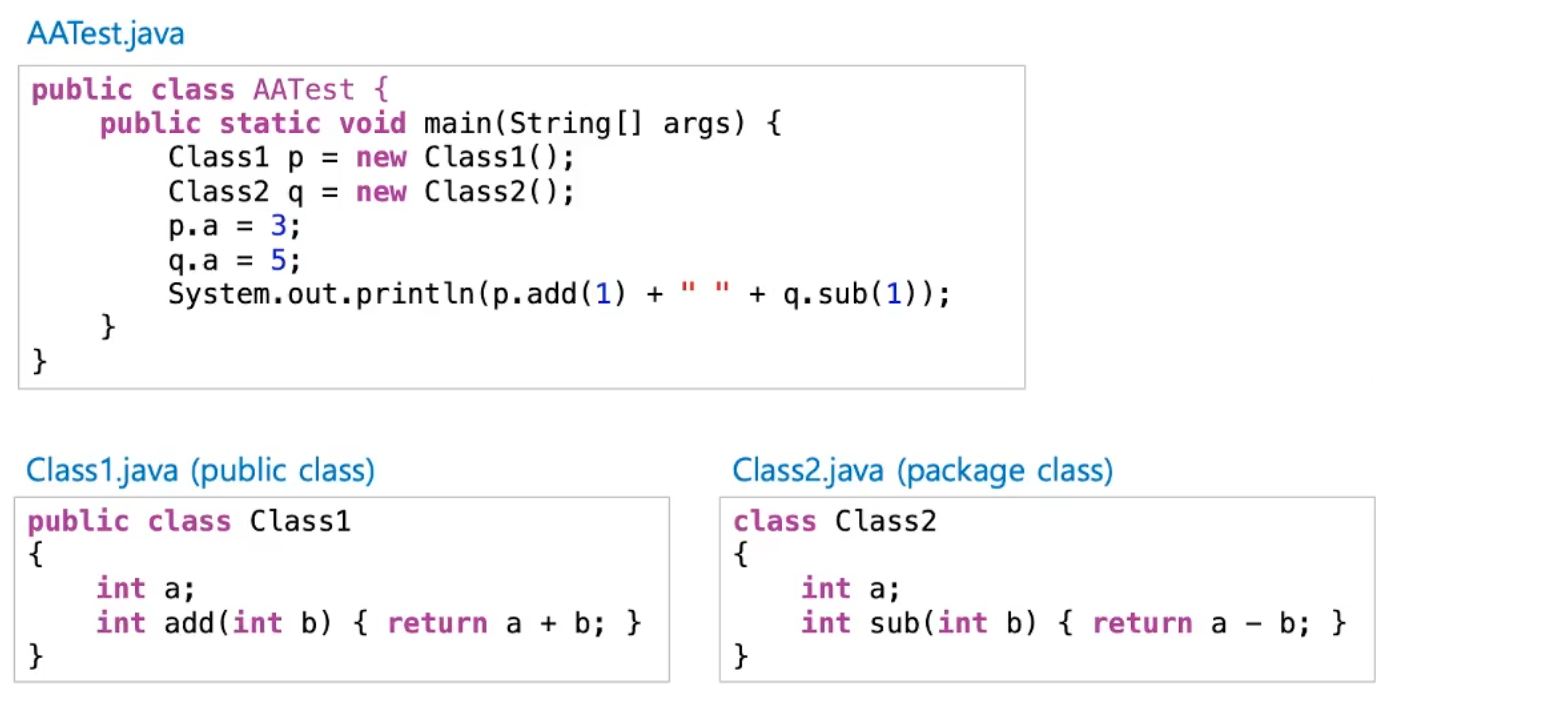
multiple classes in a single java file
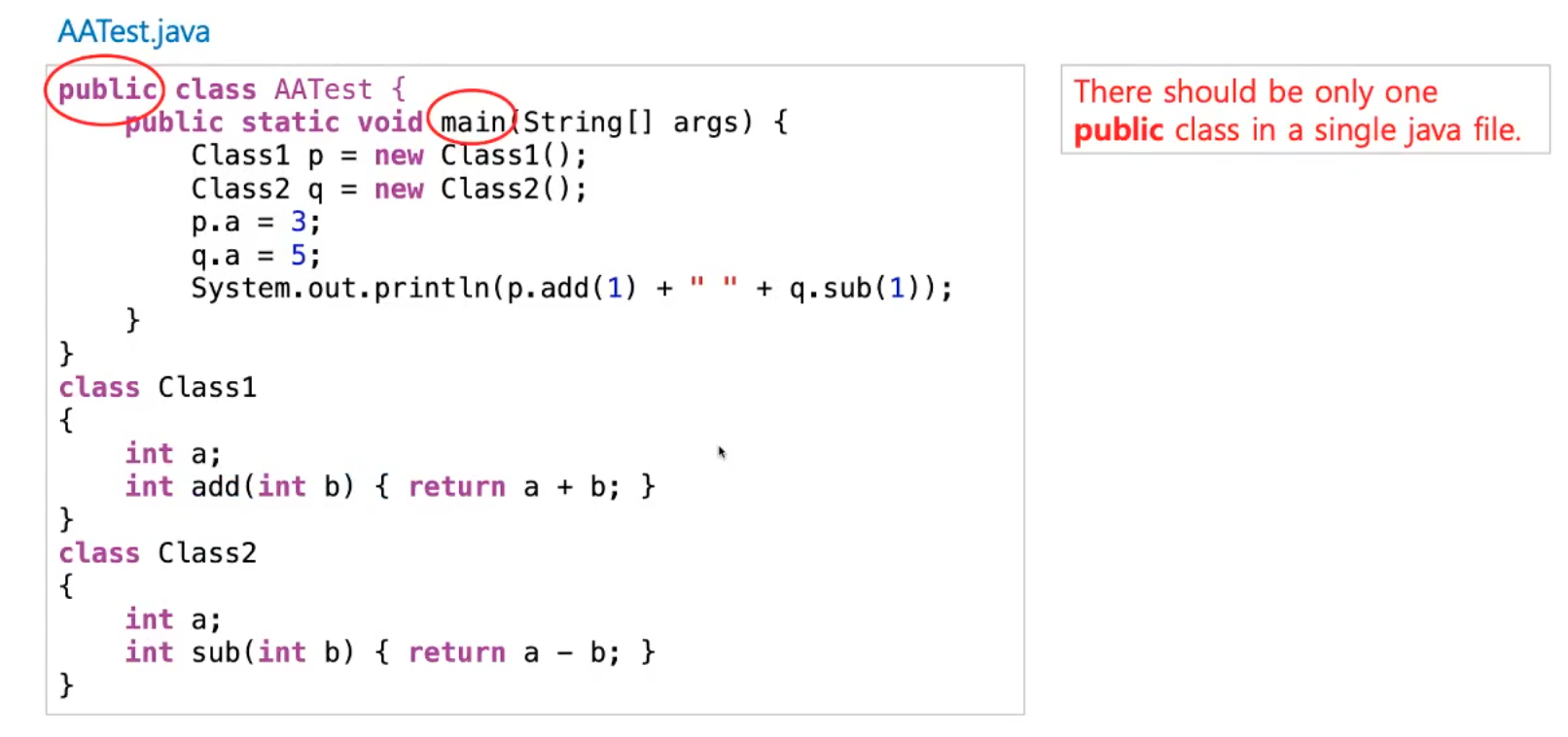
local variables
variable declared within a method definition
all method parameters are local variables
NO global variable in java

Static
static 에서는 static만 부를 수 있기때문에 myMethod 도 static 으로 해야함
parameter과 argument는 혼용해서 사용
this parameter
class MyDate {
int year;
String month;
int day;
void setMyDate ( int newYear, String month, int day) {
year = newYear;
this.month = month;
this.day = day ;
}
}equals & toString
public boolean equals (ClassName objectName)
== 는 주소가 같은지 확인
equals 는 내용이 같은지 확인 => boolean
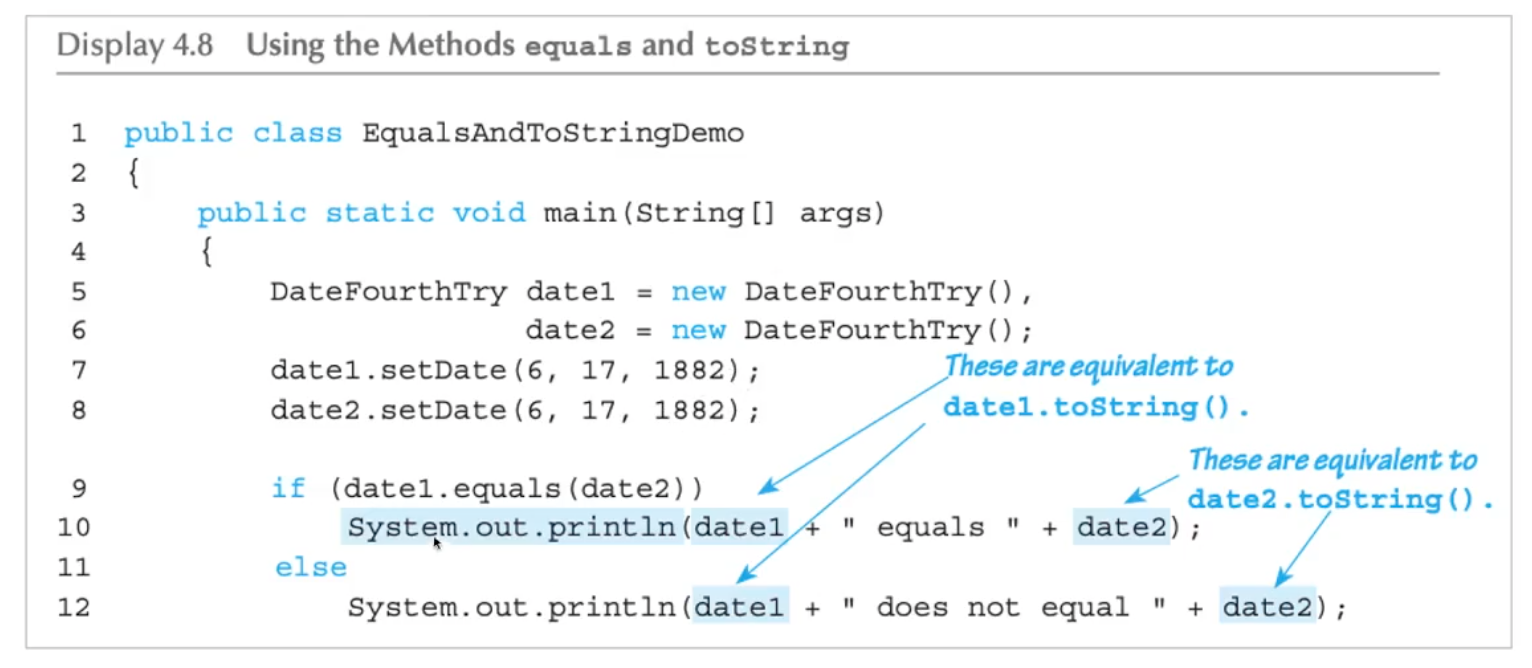
if ~~~
System.out.println(date1 + ~~ ) 에서
date1 => date1.toString()
information hiding
public & private
public :
can be used outside the class
no restriction
private :
cannot be accessed by name outside the class
good programming practice (concept of oop) -
variables: private
method: public
accessor getXXX()
data can be read but not changed
mutator setXXX()
change the value of object's instance values in a controlled manner
import java.util.Scanner;
public class DateFifthTry
{
private String month;
private int day;
private int year; //a four digit number.
public void writeOutput( )
{
System.out.println(month + " " + day + ", " + year);
}
public void readInput( )
{
boolean tryAgain = true;
Scanner keyboard = new Scanner(System.in);
while (tryAgain)
{
System.out.println("Enter month, day, and year");
System.out.println("as three integers:");
System.out.println("do not use commas or other punctuations.");
int monthInput = keyboard.nextInt( );
int dayInput = keyboard.nextInt( );
int yearInput = keyboard.nextInt( );
if (dateOK(monthInput, dayInput, yearInput) )
{
setDate(monthInput, dayInput, yearInput);
tryAgain = false;
}
else
System.out.println("Illegal date. Reenter input.");
}
}
public void setDate(int month, int day, int year)
{
if (dateOK(month, day, year))
{
this.month = monthString(month);
this.day = day;
this.year = year;
}
else
{
System.out.println("Fatal Error");
System.exit(0);
}
}
public void setMonth(int monthNumber)
{
if ((monthNumber <= 0) || (monthNumber > 12))
{
System.out.println("Fatal Error");
System.exit(0);
}
else
month = monthString(monthNumber);
}
public void setDay(int day)
{
if ((day <= 0) || (day > 31))
{
System.out.println("Fatal Error");
System.exit(0);
}
else
this.day = day;
}
public void setYear(int year)
{
if ( (year < 1000) || (year > 9999) )
{
System.out.println("Fatal Error");
System.exit(0);
}
else
this.year = year;
}
public boolean equals(DateFifthTry otherDate)
{
return ( (month.equalsIgnoreCase(otherDate.month))
&& (day == otherDate.day) && (year == otherDate.year) );
}
public boolean precedes(DateFifthTry otherDate)
{
return ( (year < otherDate.year) ||
(year == otherDate.year && getMonth( ) < otherDate.getMonth( )) ||
(year == otherDate.year && month.equals(otherDate.month)
&& day < otherDate.day) );
}
public String toString( )
{
return (month + " " + day + ", " + year);
}
public int getDay( )
{
return day;
}
public int getYear( )
{
return year;
}
public int getMonth( )
{
if (month.equalsIgnoreCase("January"))
return 1;
else if (month.equalsIgnoreCase("February"))
return 2;
else if (month.equalsIgnoreCase("March"))
return 3;
else if (month.equalsIgnoreCase("April"))
return 4;
else if (month.equalsIgnoreCase("May"))
return 5;
else if (month.equals("June"))
return 6;
else if (month.equalsIgnoreCase("July"))
return 7;
else if (month.equalsIgnoreCase("August"))
return 8;
else if (month.equalsIgnoreCase("September"))
return 9;
else if (month.equalsIgnoreCase("October"))
return 10;
else if (month.equalsIgnoreCase("November"))
return 11;
else if (month.equalsIgnoreCase("December"))
return 12;
else
{
System.out.println("Fatal Error");
System.exit(0);
return 0; //Needed to keep the compiler happy
}
}
private boolean dateOK(int monthInt, int dayInt, int yearInt)
{
return ( (monthInt >= 1) && (monthInt <= 12) &&
(dayInt >= 1) && (dayInt <= 31) &&
(yearInt >= 1000) && (yearInt <= 9999) );
}
private String monthString(int monthNumber)
{
switch (monthNumber)
{
case 1:
return "January";
case 2:
return "February";
case 3:
return "March";
case 4:
return "April";
case 5:
return "May";
case 6:
return "June";
case 7:
return "July";
case 8:
return "August";
case 9:
return "September";
case 10:
return "October";
case 11:
return "November";
case 12:
return "December";
default:
System.out.println("Fatal Error");
System.exit(0);
return "Error"; //to keep the compiler happy
}
}
}precondition postcondition in comments
/**
precondition: ~~
postcondition: ~~
**/overloading
two or more methods in the same class have the same method name
parameter의 개수가 다름 / parameter의 type이 다름
you cannot overload based on the type returned
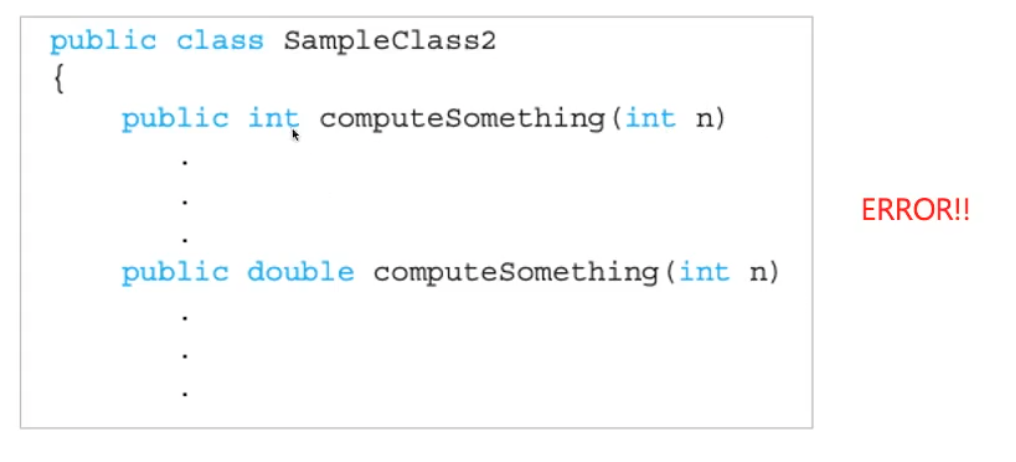
you cannot overload operators in java (C++과는 구분되는 특징)
constructors
special kind of method
public ClassName (anyParameters) {code}
ClassName objectName = new ClassName(anyArgs);
if a constructor is invoked again using new, the first obj is discarded and entirely new obj is created
import java.util.Scanner;
public class Date {
private String month;
private int day;
private int year;
public Date() { //default constructor
month = "January";
day = 1;
year = 1000;
}
public Date(int monthInt, int day, int year) { //constructor
setDate(monthInt, day, year);
}
public Date(String monthString, int day, int year) {
setDate(monthString, day, year);
}
public Date(int year) {
setDate(1, 1, year);
}
public Date(Date aDate) { // copy constructor => ch5
if (aDate == null) {
System.out.println("FatalError");
System.exit(0);
}
month = aDate.monthl
day = aDate.day;
year = aDate.year;
}
...
public setDate ...
...
}public class ConstructorsDemo
{
public static void main(String[] args)
{
Date date1 = new Date("December", 16, 1770);
Date date2 = new Date (1, 27, 1756);
Date date3 = new Date(1882);
Date date4 = new Date();
System.out.println(date1);
System.out.println(date2);
System.out.println(date3);
System.out.println(date4);
}
}default variable initializations
boolean => false
other primitives => zero
types => null
local variables are not automatically initialized
StringTokenizer
import java.util.Scanner;
import java.util.StringTokenizer
public class StringTokenizerDemo
{
public static void main(String[] args)
{
Scanner keyboard = new Scanner(System.in);
System.out.println("Enter your last name, first name, middle name)
System.out.println("if u have no middle name, enter \"none\".");
String inputLine = keyboard.nextLine(); // 정, 문경 none
String delimiters = ", "; //comma and black space
StringTokenizer nameFactoru = new StringTokenizer(inputLine, delimiters);
String lastName = nameFactory.nextToken();
String firstName = nameFactory.nextToken();
String middleName = nameFactory.nextToken();
if(middleName.equalsIgnoreCase("None"))
middleName = "";
System.out.println("Hello " + firstName + " " + middleName + " " + lastName); //hello 문경 정 //comma는 delimiter여서 안읽힘
}
}StringTokenizer.nextToken();
